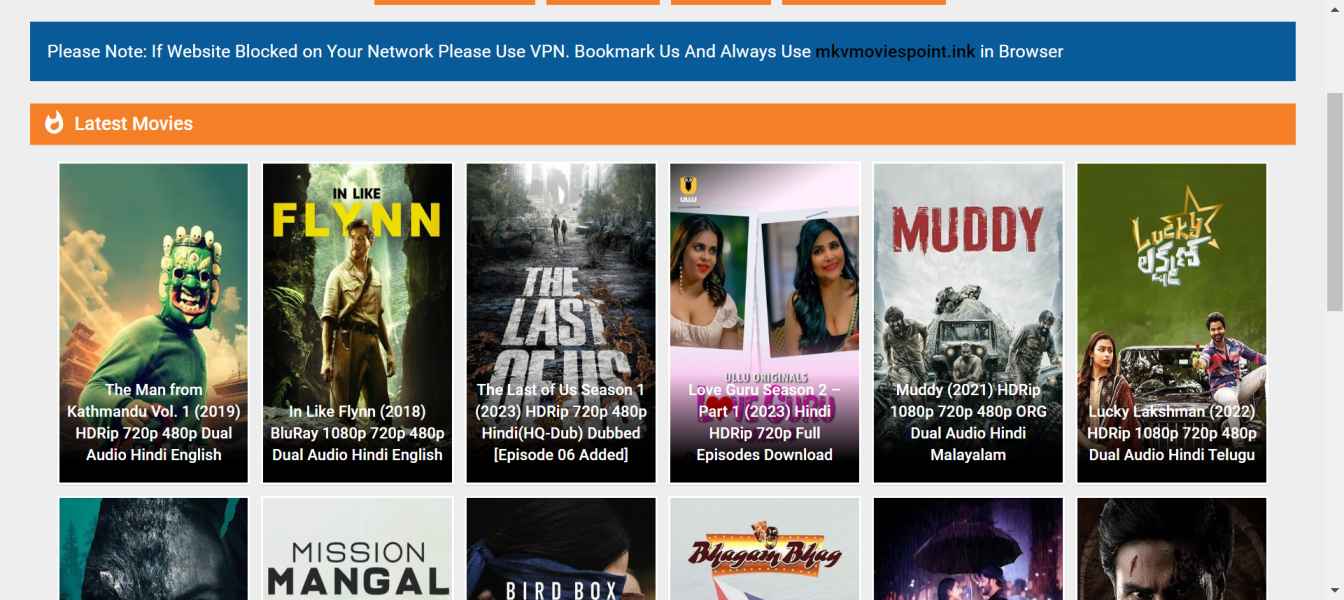Hey there, movie buffs! If you're diving deep into the world of movies, you're probably familiar with the term MKV. But what exactly is MKV, and why does it matter? Let’s face it, the ultimate guide to MKVMovies isn’t just about watching films; it’s about experiencing them in their best possible form. Whether you're a casual viewer or a hardcore cinephile, understanding MKV will change how you watch movies forever.
Now, you might be wondering, "What makes MKV so special?" Well, stick around, because we're about to break it down for you. This isn’t just another tech jargon-filled article. We’ll make sure everything is explained in a way that even your grandma could understand—or at least pretend to! So, grab your popcorn, and let's dive into the ultimate guide to MKVMovies for movie enthusiasts.
Before we jump into the nitty-gritty, let’s clarify one thing: MKV isn’t just another file extension you can ignore. It’s a game-changer for anyone who takes their movie-watching experience seriously. By the end of this guide, you’ll know everything you need to unlock its full potential. Let’s get started!
Read also:Unveiling The Rise Of Julesari Onlyfans A Comprehensive Deep Dive
Here’s a quick overview of what we’ll cover:
- What is MKV?
- Why Choose MKV Over Other Formats?
- Key Features of MKV Files
- How to Play MKV Files
- Converting MKV Files
- Best MKV Players for Your Device
- Downloading MKV Movies Safely
- Legal Considerations with MKV Movies
- Troubleshooting Common MKV Issues
- Wrapping Up: Why MKV is a Must-Have
What is MKV?
Alright, let’s start with the basics. MKV, or Matroska Video, is more than just a file format. Think of it as a digital container that holds all the elements of a movie—video, audio, subtitles, and even chapters—all in one neat package. It’s like a Swiss Army knife for media files, offering flexibility and compatibility that other formats can’t match.
But why should you care? Well, if you’re someone who loves watching movies with crystal-clear visuals and surround sound, MKV is your best friend. Unlike other formats, MKV doesn’t compromise on quality. It’s the go-to choice for movie enthusiasts who want the best experience possible.
Why MKV Stands Out
Here’s the deal: MKV isn’t just about storing movies. It’s about enhancing your viewing experience. Let me give you an example. Imagine watching a movie with multiple audio tracks—one in English, one in Spanish, and another in French. With MKV, you can switch between them effortlessly. No more restarting the movie or dealing with clunky workarounds.
Plus, MKV supports advanced features like chapters, which make navigating long movies a breeze. You can jump straight to your favorite scene without wasting time scrolling through the timeline.
Why Choose MKV Over Other Formats?
Now that you know what MKV is, let’s talk about why it’s superior to other formats. Here’s the thing: while MP4 and AVI are popular, they come with limitations that MKV doesn’t have. Let’s break it down:
Read also:Kylie Rubin The Rising Star You Need To Know About
- Quality: MKV supports lossless compression, meaning your movies will look and sound as good as the original source.
- Compatibility: MKV works seamlessly across different devices and platforms, so you don’t have to worry about compatibility issues.
- Flexibility: With MKV, you can add multiple subtitles, audio tracks, and even chapters—all in one file.
- Open Source: MKV is an open-source format, which means it’s free to use and modify. No hidden fees or licensing restrictions.
Let’s face it, who wants to deal with a file format that limits your options? MKV gives you the freedom to enjoy your movies the way you want.
Comparing MKV to MP4 and AVI
While MP4 and AVI are still widely used, they fall short in several areas. For instance, MP4 doesn’t support multiple audio tracks or chapters, which can be a dealbreaker for many users. AVI, on the other hand, is outdated and lacks the advanced features that MKV offers.
So, if you’re serious about your movie collection, switching to MKV is a no-brainer. It’s like upgrading from a basic phone to a smartphone—once you try it, you’ll never go back.
Key Features of MKV Files
Now that we’ve established why MKV is the king of movie formats, let’s dive deeper into its features. Here’s what makes MKV truly special:
- Multiple Audio Tracks: Watch movies in different languages without needing separate files.
- Subtitles Support: Add as many subtitles as you want, and switch between them on the fly.
- Chapters: Easily navigate through long movies with built-in chapter markers.
- Lossless Compression: Enjoy high-quality video and audio without sacrificing file size.
- Customizable Metadata: Add information like title, artist, and genre to your files for better organization.
These features make MKV the ultimate format for movie enthusiasts. Whether you’re watching a blockbuster or an indie film, MKV ensures you get the best possible experience.
How MKV Enhances Your Viewing Experience
Imagine this: you’re watching a foreign film with subtitles, but you want to hear the original audio. With MKV, you can toggle between the original language and your preferred subtitles without missing a beat. Or, if you’re a fan of surround sound, MKV supports advanced audio formats like DTS and Dolby Digital, giving you a theater-like experience in the comfort of your home.
Plus, the ability to add chapters means you can pick up where you left off without having to guess where you stopped. It’s like having a personal movie assistant at your fingertips.
How to Play MKV Files
Alright, you’ve got your MKV files ready, but how do you play them? Don’t worry, it’s easier than you think. Most modern media players support MKV out of the box, but if you’re using an older player, you might need to install a codec pack.
Here are some of the best players for MKV files:
- VLC Media Player: A free, open-source player that supports virtually every format, including MKV.
- Kodi: A powerful media center that lets you organize and stream your MKV collection.
- MPC-HC: A lightweight player that’s perfect for Windows users.
Pro tip: Always keep your media player updated to ensure compatibility with the latest MKV features.
Tips for Playing MKV Files
Here are a few tips to make the most of your MKV experience:
- Check for Codecs: If your player can’t play MKV files, make sure you have the necessary codecs installed.
- Use External Subtitles: If your MKV file doesn’t have built-in subtitles, you can add external ones easily.
- Adjust Settings: Tweak the player settings to optimize video and audio quality.
With these tips, you’ll be streaming your favorite movies in no time.
Converting MKV Files
Sometimes, you might need to convert MKV files to another format, especially if you’re sharing them with someone who doesn’t have a compatible player. Here’s how you can do it:
There are plenty of tools available for converting MKV files, both free and paid. Some popular options include:
- HandBrake: A free, open-source tool that lets you convert MKV files to MP4 and other formats.
- FFmpeg: A command-line tool for advanced users who need more control over the conversion process.
- Online Converters: If you’re short on time, you can use online services like CloudConvert or Online-Convert.
Just remember, converting MKV files can result in a loss of quality, so it’s always best to keep the original file as a backup.
When to Convert MKV Files
While MKV is the best format for most users, there are situations where converting it might be necessary. For example:
- Device Compatibility: Some devices, like older smartphones or gaming consoles, don’t support MKV.
- File Size: If you need to reduce the file size for storage or sharing purposes, converting to a more compressed format like MP4 might be the way to go.
- Specific Features: If you need a format that supports certain features, like DRM protection, you might need to convert your MKV files.
Ultimately, the decision to convert depends on your specific needs and preferences.
Best MKV Players for Your Device
Now that you know how to play MKV files, let’s talk about the best players for different devices. Here’s a quick rundown:
- Windows: VLC Media Player, MPC-HC, KMPlayer
- Mac: VLC Media Player, MPlayerX, Elmedia Player
- Android: VLC for Android, MX Player, KMPlayer
- iOS: VLC for iOS, Infuse, PlayerXtreme
No matter which device you’re using, there’s a player out there that can handle MKV files with ease.
Choosing the Right Player
When selecting a player, consider factors like:
- Features: Does the player support all the features you need, like subtitles and chapters?
- Performance: How well does the player handle large files and high resolutions?
- User Interface: Is the player easy to use, or does it have a steep learning curve?
By choosing the right player, you’ll ensure a smooth and enjoyable movie-watching experience.
Downloading MKV Movies Safely
Now, let’s talk about downloading MKV movies. While there are plenty of websites offering free downloads, it’s important to stay safe and avoid scams. Here’s how you can download MKV files safely:
- Use Trusted Sources: Stick to reputable websites like The Pirate Bay, RARBG, or 1337x.
- Check File Integrity: Always verify the file size and hash to ensure you’re downloading the correct file.
- Run Virus Scans: Before opening any downloaded files, scan them with a reliable antivirus program.
Remember, downloading movies illegally can have legal consequences, so always make sure you have the right to download the files you want.
Legal Considerations
While downloading MKV movies can be tempting, it’s important to consider the legal implications. In many countries, downloading copyrighted material without permission is illegal and can result in fines or even jail time.
Instead of risking it, consider using legitimate streaming services or purchasing digital copies of your favorite movies. Not only will you be supporting the creators, but you’ll also avoid any potential legal issues.
Legal Considerations with MKV Movies
Speaking of legal considerations, let’s dive deeper into this topic. Here’s what you need to know:
- Copyright Laws: Understand the copyright laws in your country and how


